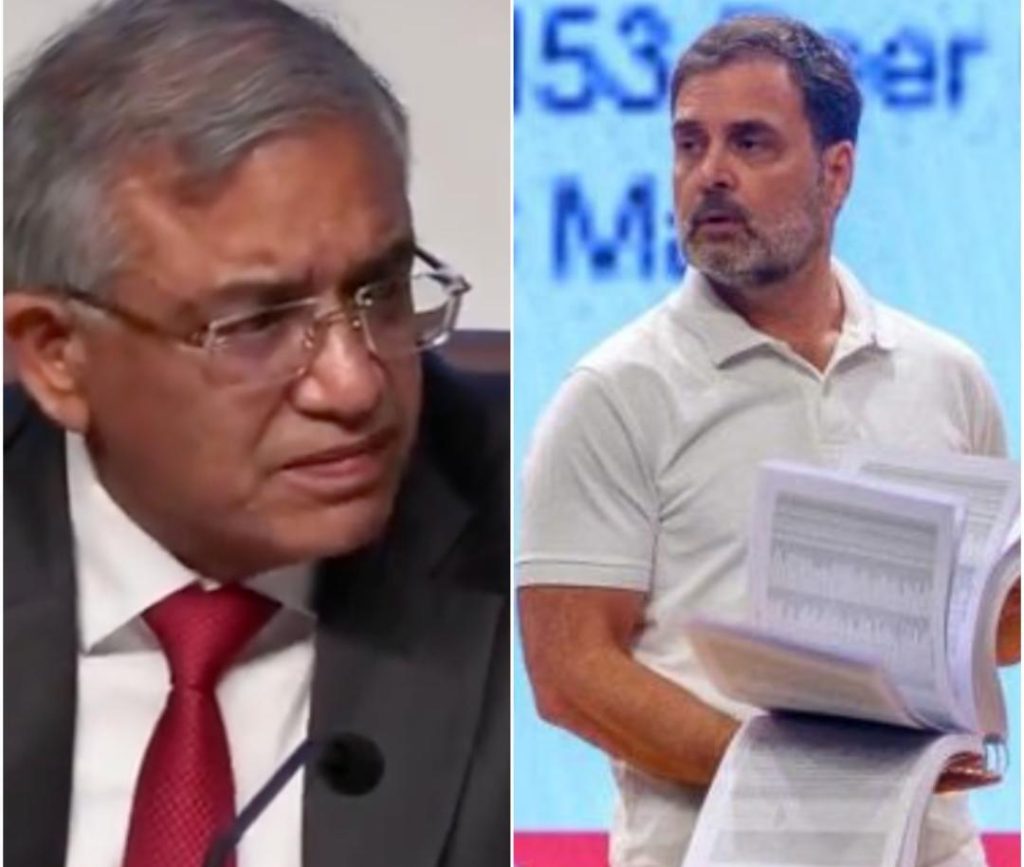
Vote Chori’ Phrase an Insult; Should We Share CCTV Footage of Mothers & Sisters Voting?: EC
The ongoing political debates in India have taken a new turn with the use of the phrase “vote chori” (vote theft) by Congress leader Rahul Gandhi. The term has sparked controversy, with the Election Commission of India (EC) criticizing it as an insult to the Constitution. The EC has also raised concerns over the demand for releasing surveillance footage from polling booths, citing voter privacy concerns.
The debate began when Rahul Gandhi accused the Bharatiya Janata Party (BJP) of indulging in vote theft and rigging the elections. Gandhi’s claim was met with strong opposition from the BJP, which accused him of spreading misinformation and trying to discredit the democratic process. The EC, however, took a more nuanced approach, criticizing the use of the phrase “vote chori” as an insult to the Constitution.
Gyanesh Kumar, the Chief Election Commissioner, stated that the EC would not tolerate any language that undermined the sanctity of the electoral process. He emphasized that the EC was committed to ensuring free and fair elections, and any attempts to discredit the process would not be tolerated.
The EC’s criticism of the “vote chori” phrase has sparked a broader debate about the role of language in politics. Many have argued that the use of such phrases can incite hatred and divisiveness, and undermine the trust in the democratic process. Others have defended the use of the phrase, arguing that it is a legitimate way to express concerns about electoral integrity.
However, the EC’s stance on the issue is not without controversy. Some have argued that the EC’s refusal to release surveillance footage from polling booths is an attempt to cover up any wrongdoing. The EC has cited voter privacy concerns as the reason for not releasing the footage, but many have questioned the validity of this argument.
In an interview, Gyanesh Kumar was asked whether the EC would release the CCTV footage of any voter, including their mothers, daughters-in-law, or other family members. Kumar’s response was clear: “Should the Election Commission share the CCTV videos of any voter, including their mothers, daughters-in-law? It’s a matter of privacy, and we cannot do that.”
Kumar’s statement highlights the tension between the need for transparency in the electoral process and the need to protect voter privacy. The EC has a duty to ensure that the electoral process is fair and transparent, but it also has a duty to protect the privacy of voters.
The demand for releasing surveillance footage from polling booths is not a new phenomenon. In the past, there have been instances where footage has been leaked, revealing irregularities in the electoral process. However, the EC’s refusal to release footage has sparked concerns that the Commission is trying to cover up any wrongdoing.
In conclusion, the “vote chori” phrase and the demand for releasing surveillance footage from polling booths have sparked a broader debate about the role of language in politics and the need for transparency and accountability in the electoral process. While the EC’s criticism of the phrase is justified, its refusal to release footage raises concerns about voter privacy and transparency.
As the election season heats up, it is essential that political parties and leaders refrain from using language that undermines the democratic process. Furthermore, the EC must ensure that it strikes a balance between transparency and voter privacy, and that it takes concrete steps to address concerns about electoral integrity.






